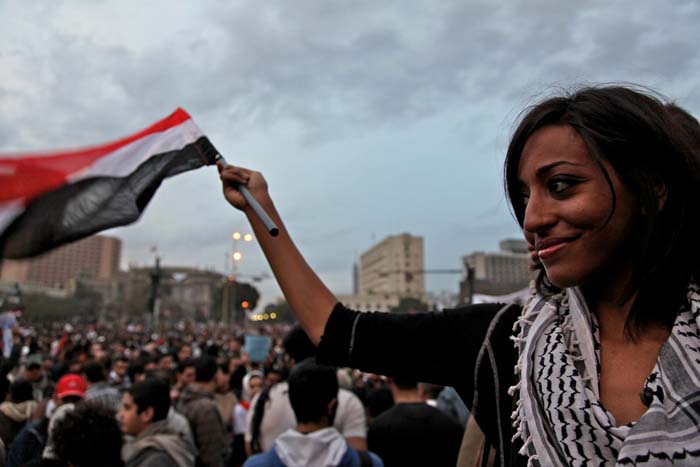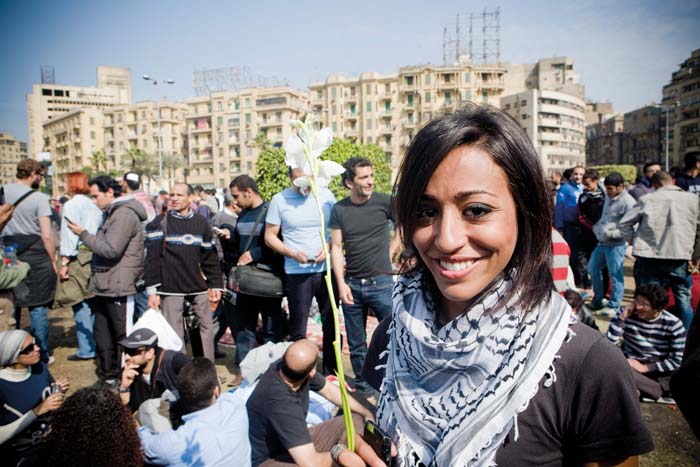|
From Twitter to Tahrir
With her live tweets, Gigi Ibrahim '11 played a significant role as a citizen journalist during the revolution
 Photographed by Rachel Beth Anderson
Photographed by Rachel Beth Anderson
Future generations will
remember the Egyptian
Revolution for many reasons:
for the protestors' insistence on nonviolence,
for its ripple effect across the
region, for the way it brought about
the dramatic end of the Mubarak
regime, and for the way youth –– the
chief agents of the revolution –– were
able to mobilize new technological
tools to further its spread. Indeed,
newspapers and international coverage
focused so much attention on the use
of social media in the revolution that,
for a time, it was termed –– perhaps
hyperbolically –– the first Facebook
Revolution.
A handful of young, entrepreneurial
activists were behind this
transformation in the tools of protest,
alerting the world through their
tweets minute-by-minute, often
getting news out long before any
established news bureaus could report
the story. Gigi Ibrahim '11, perhaps
better known by her twitter handle
@Gsquare86, is one such activist. The
AUC graduate, who has a history in
activism, was one of only a few who
were able to tweet, even through the
Internet blackout.
Ibrahim is vivacious and active. She
has a tendency to act out her stories
as she tells them: dipping and
ducking, gesturing as she
demonstrates the events of various
protests. Her history in activism is
long and varied, beginning with her
teenage years in California, after
which she came to AUC to major in
political science.

Ibrahim credits a class she took at
the University with inspiring her to
return to political activism in Egypt.
"I took a political science seminar
about social mobilization under
authoritarian regimes, and through
this, became aware and read all about
the history of mobilization," she
said. "I was so inspired that I started
to contact people from many of the
activist movements in Egypt and
began attending meetings and
protests on the subject. It was
through this that I got involved with
Al-Haraka Al-Shababiya Al-Democratia
Lil Tagheer (The Popular Democratic
Youth Movement for Change)."
It was through this group that
Ibrahim joined the ranks of citizen
journalists. "I would go to protests
and tweet what is happening," she
said. "Even in those days, we would
organize using all sorts of social
media sites and in face-to-face
meetings. Thousands of people
would say they were attending, but
then it would be the same 50 people
at each protest."
Still, she maintains that the role of
social media was important for the
foil it played against state-run media.
"In an authoritarian regime, any
form of citizen journalism becomes
activism," she explained, adding that
the January 25th Revolution was
supported by new social media
technologies, but not inspired by
them. "There is no revolution
without a struggle," she said. "Social
networks made this logistically easier,
but this could not have happened
without dedicated activists and the
existence of a collective struggle."
As @GSquare86, Ibrahim has
more than 11,000 followers from
Egypt and across the world. She tweets about events in Egypt and
developments in the continuing
revolutions across the Middle East in
Yemen, Bahrain, Libya and Syria.
Even while using this personal
twitter handle, she is aware of the
importance attached to her words.
"Verification is very important to
me," she affirmed, crediting the
close-knit community of activists
that has developed with ensuring
that the news they put out is
accurate. "It is very important to
confirm anything that I tweet or
re-tweet if I did not see it with my
own eyes."
Due to her role in getting
information out when there was
little indication to the rest of the
world just what was going on at the
beginning of the revolution, Ibrahim
has received worldwide attention.
A Skype interview with her was
broadcast over the Lede blog of The
New York TimesWeb site, and she was
one of a handful of Egyptian youth
to be featured on the cover of TIME magazine's edition about the
Egyptian Revolution. "I could never
have imagined how much the
revolution was going to change my
life personally," said Ibrahim. "On a
personal level, my family has always
thought of my activism as risky and
useless. I even had to lie to go to
protests. When the revolution
happened and they saw how my role
was important, it was like winning
two revolutions: one for the country
and one with my family and
everyone who doubted me. In this
post-revolutionary era, it is great to
see all of us on the same page."
By Madeline Welsh
|
